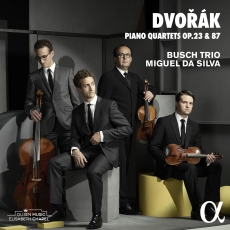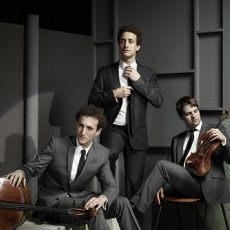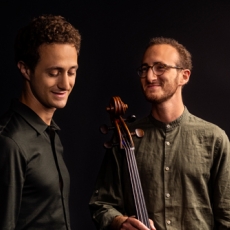Busch Trio - Dvořák: Piano Quartets Nos. 1 & 2 - Fanfare
As early and late productions in Dvořák’s career, his two piano quartets are of unequal quality, but they make natural discmates. I almost always find myself playing only op. 87 (No. 2), a near-masterpiece on the order of the Piano Trio No. 3, op. 65. In both works the best music is inspired and the merely good music is still winning. Although we think of Dvořák as quintessentially Czech, he had European aspirations that fixed his gaze towards Vienna and Brahms. The Slavic flavor is strong in a work like the “Dumky” Trio, but to some extent, like Mahler, Dvořák was exploring and inventing in the folk idiom, not simply adopting folk music that lay ready to hand. Brahms and Liszt did the same in their Hungarian music.
In Piano Quartet No. 1 the two worlds of Dvořák’s musical imagination appear immediately, first in a folksong-sounding main theme, which is capped with a Brahmsian flourish attached at the end. The Busch Trio gives full expression to both, making the folk material ebullient and simple, the Brahmsian elements richly detailed with the interplay among voices brought out clearly. As in their widely admired 2016 disc of Dvořák’s late piano trios (reviewed in Fanfare 40:2 by Jerry Dubins and in 40:3 by me), the level of musicianship on this new release is impressive. I wrote, “We love Dvořák’s chamber works for obvious reasons: their charm, melody, and warmth. Those qualities are beautifully captured in these new performances by the London-based Busch Trio—Omri Epstein, piano, Mathieu van Bellen, violin, and Ori Epstein, cello.” The Epsteins are brothers from Israel; van Bellen is Dutch and plays the 1783 Guadagnini violin once owned by Adolf Busch, after whom the group is named.
I most admire chamber-music ensembles where each player asserts his own individuality rather than aiming for a blended, homogenized sound, however beautiful. The Busch Trio, joined by Belgian violist Miguel da Silva, strike a comfortable mid-point, recognizing that no piano trio in the modern era will sound as Romantically expressive, even fulsome, as Cortot-Thibaud-Casals. As recorded here, the Busch’s tone is bright and transparent; neither reading suggests retro tendencies.
I noted in their previous Dvořák album that pianist Omri Epstein is not simply accomplished but delightful, displaying agility and brilliance while without dominating the two string players. The same compliment applies here, although now I find the string sonority a little thin. This lightness is very winning in the nimble outer movements of op. 23. But some listeners might prefer the warmer blend on the Sony recording of op. 87 from Ax-Stern-Ma. I find the Busch Trio more incisive and dramatic, however, and consider their new recording a good replacement. Piano Quartet No. 2 gives the performers more to work with, naturally, and one relishes how sensitively the ensemble phrases the wistful Lento second movement. The Scherzo is a Viennese waltz in all but nationality until a gypsy flavor enters; the concoction is one of Dvořák’s most elegant interludes of salon music. The finale has a few fiery passages that come close to the passionate outbursts in the “Dumky” Trio, although it settles into geniality for the most part.
Alpha’s recorded sound is more about clarity than impact, adding to an overall impression of lightness rather than robustness. Since I found everything to enjoy and nothing to criticize in these performances, I think the Busch Piano Trio have done themselves much good with this release.


